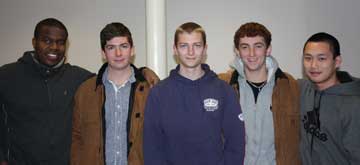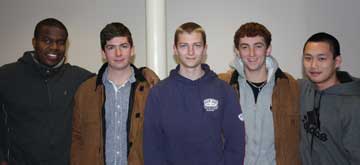 KINGSTON, R.I. – Sept. 18, 2013 – If you think math instruction today is all about pondering equations with lots of numbers and squiggly marks, guess again. More and more, students across the globe are using math to solve real-world problems.
KINGSTON, R.I. – Sept. 18, 2013 – If you think math instruction today is all about pondering equations with lots of numbers and squiggly marks, guess again. More and more, students across the globe are using math to solve real-world problems.
It’s called “math modeling,” and this weekend the University of Rhode Island’s mathematics department will host a regional competition that gives undergraduates an opportunity to investigate (and maybe even solve) big questions about the world.
The Northeast Regional Math Modeling Challenge will start at 2 p.m. Sept. 21 and run through Sept. 22 at Ballentine Hall on the Kingston campus. Seven teams of three students each are participating: one from URI; one from Merrimack College in North Andover, Mass.; two from the University of Massachusetts, Dartmouth; and three from Mount Holyoke in South Hadley, Mass.
The URI team is Drew Haughton, of North Attleboro, Mass.; Robert D.C. Hamilton, of Tuscaloosa, Ala.; and Robert Piispanen, of Winchester, Mass. All are sophomores studying engineering.
Jessica Libertini, an assistant professor in URI’s math department and contest organizer, has been involved with the competition in the Mid-Atlantic for years and encouraged organizers to hold one in the Northeast this year.
“It’s a great opportunity for URI’s math students,” she says. “Math modeling is a hot topic in undergraduate math education. As problem-based learning gains momentum in higher education, math modeling is coming to the forefront of the curriculum.”
The students, working in teams, will answer questions that can be investigated with mathematical models. Examples: Predict the financial health of the U.S. Postal Service and explain what you would do to prolong its life? What will the market for college textbooks look like in a decade – will students rent books, buy books online or buy used books? What is an effective, feasible and cost-efficient water strategy for the United States to meet its projected water needs in 2025?
Research shows that students learn best when they’re actively involved in the process. In math modeling, students tackle real-world issues, first finding traceable elements of the problems and then applying math concepts.
After gathering at 2 p.m. Saturday, teams will choose one of two proposed questions. They will brainstorm for the next 23 hours and submit a one-page summary to the judges, math professors from the participating colleges.
Teams receive written feedback on their summaries and receive certificates for a rank of “outstanding,” “meritorious,” “successful participant” or “unsuccessful participant.”
Students will also give presentations about their findings to the entire group – a great way to share research with students and faculty. After the presentations a “People’s Choice Award” will be given to one team.
For more information, contact Libertini at jlibertini@math.uri.edu. The public is invited to the presentations starting at 2:30 p.m. Sept. 22 and to the awards event, both at Lippitt Hall. Contest information is available at http://www.math.uri.edu/~jlibertini/NRMMC/NRMMC13/index.html.
“Math modeling is becoming huge,” says Libertini. “So many of today’s challenges are interdisciplinary and multidisciplinary and math modeling is at the heart of addressing these complex challenges. It’s changing the way we, as research mathematicians, engage with colleagues in other disciplines.”
The emphasis on math modeling is also changing the way the next generation is educated, from new problem-solving practices in the common core standards for kindergarten through grade 12, to new courses and new faculty in the math department at URI.
Libertini, in her second year teaching at URI, has developed a general education course focusing on math modeling for food policy that explores the connections between human health, ecological health and land use.
Chris Goodrich, an assistant math professor in his first year, is developing a math biology course to teach students how to apply math modeling skills to study questions like the spread of infectious disease. Both Goodrich and Libertini conduct math modeling research on topics such as tumor growth and large networks, from Facebook to terrorist organizations.
The first math modeling challenge was hosted by the University of Iowa in 2008. In addition to the Rhode Island site, contests will be held at Shippensburg University in Pennsylvannia, the University of Wisconsin, LaCrosse, and the University of Iowa. URI’s mathematics department and the University’s chapter of the Society for Industrial and Applied Mathematics, or SIAM, are sponsoring the Rhode Island contest.
Pictured above
URI students who participated in a previous math modeling contest: Left to right, Kenneth Sulaimon of Providence; Robert D.C. Hamilton of Tuscaloosa, Ala.; Drew Haughton of North Attleboro, Mass.; Robert Piispanen of Winchester, Mass.; and Ricky Liang of Glen Cove, N.Y. All are sophomores studying engineering. Photo by Jessica Libertini

